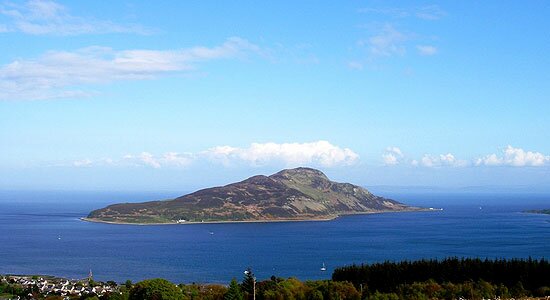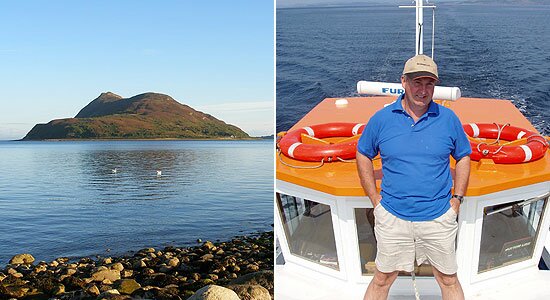- Howard Wood is the chairman of COAST - Community of Arran Seabed Trust
I have battled and campaigned against the short sightedness of Government fishing policy for 15 years. In September 2008 Scotland got its first, small no take zone in a part of Lamlash Bay off the Isle of Arran. The rest of the Bay was to be designated a Marine Conservation Area but it has not happened yet.

Lamlash Bay, Isle of Arran, where a no take zone has been established
This despite the entire project, Lamlash Bay Community Marine Conservation Area, being trumpeted through the press in January 2008 by Richard Lochhead, SNP Minister, as an excellent joint Community, Government & Fishermen project.
The inertia appears to be due to Mr Lochhead and civil servants worrying about upsetting the trawling & dredging fishing industry.
The Clyde Fishermen’s Association walked away from talks to implement the scheme in January 2009 and thereafter Marine Scotland, the department that overseas the marine environment, has refused to allow the Marine Conservation Area to even appear on the agenda of meetings.
Subsequent meetings have been cancelled or postponed. Procrastination is the name of the game.
So how did we get a no take zone in the first place?
It started with a couple of divers seeing species disappearing in the 1980s. The Community of Arran Seabed Trust (COAST) was established and with membership growing to 1,800, a third of the island’s population and ten times more than all Clyde fishermen put together, it is now truly a community led project.
The islanders know that fish stocks in the Clyde have collapsed. International sea angling competitions ceased in the mid ‘90s as there were no fish left to catch. COAST proposed in 1995 that a small area around the island be closed to all fishing to allow it to naturally regenerate.
For over 13 years constant pressure was put on a series of governments, who believed effort control was the only way to manage fisheries. COAST was told the only way to move forward with their proposals was to get 100 per cent of Clyde fishermen to agree to it.
Time went by and more than 70 per cent of the Clyde fishing fleet either went bust or sold their boats. The Clyde was left with just prawns and scallops as commercial catches. Yet ministers still refused to recommend our proposals. The fishing industry don’t like it we were told.
In 2004 COAST petitioned the Scottish Parliament. For two years this petition slowly moved forward with the support of politicians from all sides. It came before the environment committee who backed the project and instructed the minister to move it forward.
As part of the implementation process the government put the marine reserve out to a full public consultation, the result was overwhelming with 99.4 per cent in favour.
So due entirely to people power, the present minister implemented the first part of the proposal. This was an example of how people and politicians can work together to change government policy for the benefit of future generations.

Lamlash Bay, Arran and Howard Wood of he Community of Arran Seabed Trust
After spending 15 years dealing with the Scottish Government my opinion is that the fishing industry has a disproportionate and unhealthy influence on the government.
The sea and what it produces is a common resource owned by everyone not just fishermen. Glossy documents and reports mean nothing unless there is change.
When the EC proposed sensible measures to resurrect the Clyde white fish stocks last December the Scottish Government backed the fishermen to carry on as normal with failed effort control.
The Scottish Government does not appear to have one environmental brain cell. It has to be understood that you need a healthy marine environment before you can have a healthy fishing industry.
At present governments and the fishing industry spend all their time watering down the Marine Bill, with their insistence that fishing is put at the top of the agenda. In other words, more of the same disastrous policies of the last 30 years.
Community of Arran Seabed Trust
![]()



Howard, any idea how bad things are in the Firth of Forth?
Hi Angus
I don’t know what the state of the Forth is, without researching it. I can guarantee it will be down to a fraction of the biodiversity that was there 30-50years ago. Us humans have got into the habit of just remembering what life in the sea was like when we were young. We tend not to believe our fathers & grandfathers tales of huge fish & catches. Amazingly there was a tuna fishing industry in the North sea in the 1930s!!.
If you are interested in discovering that its not just the END of the LINE thats telling us we need to change, here is a list of my recomended books to read.
In a Perfect Ocean by Daniel Pauly & Jay MacLean
Sea Change by Richard Girling
The Empty Ocean by Richard Ellis
The Unnatural History of the Sea by Callum Roberts
Bottom feeder by Taras Grescoe
The End of the Line by Charles Clover
If you are keen to find out the state of the Forth, If you contact me through our website I should be able to find someone who can help you.
Regards Howard
Howard, keep up the great work, the marine environment needs you!
The current attitude of commercial fisherman in the whole Clyde area is an absolute disgrace, they show no guilt towards their single handed destruction of the marine environment which once flourished. They have also destroyed the lively hood of future generations and seem to have the government completely wrapped up in their lies and deluded attitude. The whole Clyde area must be closed to commercial nets to allow any form of substantial recovery to take place. Their is simply no fish left and sea birds and other mammals such as seals are also in serious trouble. The Scottish governments past and present should hang their head in shame for allowing undoubtedly one of the richest fishing areas in the U.K to collapse. Taking with it thousands of jobs and economic income on a grand scale.